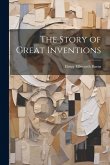"Historic Inventions" by Rupert Sargent Holland offers a fascinating look into the groundbreaking innovations that have shaped human civilization. From the printing press to the cotton gin, the book chronicles the stories behind these inventions and the individuals who brought them to life. Holland vividly portrays the social and economic impact of each invention, revealing how they transformed industries, altered daily life, and propelled society forward. Readers will gain a deeper understanding of the ingenuity and perseverance required to overcome the challenges faced by early inventors. This accessible and engaging account is perfect for anyone interested in the history of technology and the profound influence of innovation on the modern world. This work has been selected by scholars as being culturally important, and is part of the knowledge base of civilization as we know it. This work was reproduced from the original artifact, and remains as true to the original work as possible. Therefore, you will see the original copyright references, library stamps (as most of these works have been housed in our most important libraries around the world), and other notations in the work. This work is in the public domain in the United States of America, and possibly other nations. Within the United States, you may freely copy and distribute this work, as no entity (individual or corporate) has a copyright on the body of the work. As a reproduction of a historical artifact, this work may contain missing or blurred pages, poor pictures, errant marks, etc. Scholars believe, and we concur, that this work is important enough to be preserved, reproduced, and made generally available to the public. We appreciate your support of the preservation process, and thank you for being an important part of keeping this knowledge alive and relevant.
Bitte wählen Sie Ihr Anliegen aus.
Rechnungen
Retourenschein anfordern
Bestellstatus
Storno








